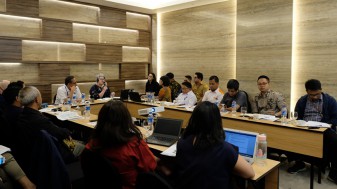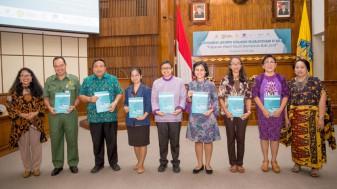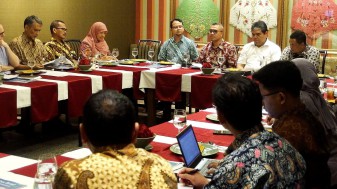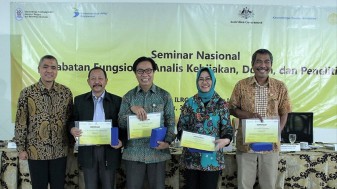The government announced six social safety nets (JPS) programs to mitigate the impact of Covid-19 for marginalized groups. These include additional recipients of the Family Hope Program (PKH), Staple Food Cards, Pre-Employment Cards, electricity subsidies, additional market and logistical operations, and credit payment relief for informal workers. Responding to this assistance, Deputy Director of Research and Outreach of The SMERU Research Institute, Athia Yumna, said JPS is indeed what is needed to overcome the systemic shocks experienced by many people in a country experiencing the current Covid-19 pandemic.
"The government (needs to) be more serious and innovative in updating social security recipient data. One way is to open cooperation with the private sector,” Athia said in KSIxChange 20 online discussion entitled “Recommendations on the Implementation of Social Safety Net Policies for Marginal Groups Affected by Covid-19”, on Monday, April 13, 2020.
To ensure that aid is on target, Athia suggested that the government prepare a variety of data collection mechanisms for prospective recipients to make it easier to access assistance and avoid crowds. Compiling the Integrated Social Welfare Data (DTKS) can be done via alternative means, for example, in collaboration with private parties, such as online transportation providers or other independent registrations.
Regarding the distribution of aid, Athia provided recommendations for the government to pay consider the diverse characteristics of recipients. For urban groups with higher digital literacy, the government can work closely with financial technology providers and minimarkets. For more conventional rural groups, assistance can be channeled through bank transfers or officeless financial services such as lakupandai.
“Specifically for independent registration, the government needs to work with several telecommunications service providers to send notifications about the assistance program,” Athia said.
For the implementation of the Pre-Work Card program, Athia suggested that the government adjust the priority needs during the pandemic. This training should be targeted at people who recently lost their jobs due to the Covid-19 outbreak. Training material can be focused on how to produce medical devices considering the needs during the pandemic.
Also read the publication by SMERU Institute "Jaring Pengaman Sosial dalam Krisis COVID-19: Apa yang Saat Ini Perlu Dilakukan oleh Pemerintah?"
Regarding electricity subsidies, Athia recommended that the government expand the scope of beneficiaries to all customers from any group with a power limit of up to 900 VA. To avoid wasteful consumption of electricity, the government can change the assistance scheme to a deduction of electricity costs with a specified amount.
“The moral hazard of free electricity or a 50 percent discount from the total bill is excessive use of electricity,” Athia said.
Micro and small businesses also need to get help so they can continue to produce. Athia recommends a policy of reducing the charges that must be paid by small entrepreneurs to e-commerce platform. Other assistance in the form of expanding access to capital, extending the deadline for loan payments, reducing electricity bills, guaranteeing the availability of production inputs, tax incentives, and clear rules regarding the deadline for contract payments to micro and small businesses by medium and large businesses.
Meanwhile, Expert Staff on Social Affairs and Poverty Prevention of the Ministry of Development Planning/National Development Planning Agency (Bappenas) Vivi Yulaswati said that assistance was indeed given to the poor and vulnerable groups but the government also pays attention to aspiring middle class groups. This group can drop out of their class if they fail to get their income due to being affected by Covid-19.
“That is why there needs to be adaptive protection, social safety net beneficiaries expanded," Vivi said.
Director General of Social Protection and Social Security of the Ministry of Social Affairs Pepen Nazaruddin said that the six social safety nets are regular programs that are expanded. He said there are also other programs from the Ministry of Social Affairs related to Covid-19 mitigation. Non-regular assistance include assistance for the Greater Jakarta area, such as special assistance to DKI Jakarta in the form of 200,000 staple food packages; death benefit for Covid-19 heirs; staple food packages for 460 Social Welfare Institutions in Greater Jakarta area; and assistance for strengthening 10,000 community empowerment cadres.
“The assistance was at first only given to DKI Jakarta, but eventually it was extended to Greater Jakarta because it was a Covid-19 epicenter,” Pepen said.
Other Ministry of Social Affairs efforts to mitigate the effects of the pandemic include preparing government rice reserves, mobilizing social pillars, supporting emergency relief and personal protective equipment, and preparing Social Rehabilitation/Education and Training Centers for quarantine. Pepen realizes that there are still a lot of poor people who have not received social assistance programs, both those who have enrolled in DTKS and those who have not. For this reason, he asked vulnerable groups that have not registered to report to the social service as soon as possible. Pepen hopes that district/city governments actively update their data so that assistance can be immediately disbursed.
For information, the social safety nets provided by the government include increasing the number of Family Hope Program (PKH) beneficiaries from 9.2 million to 10 million families; as well as increasing the benefit by 25 percent. For example, maternal allowance is increased from Rp 2.4 million to Rp 3 million per year; early childhood component to Rp 3 million per year; disability to Rp 2.4 million per year; elderly to Rp 2.4 million per year, and this policy is effective April 2020.
Second, the number of Staple Food Card recipients will be increased to 20 million beneficiaries and the value increased by 30 percent from Rp 150 thousand to Rp 200 thousand to be given for nine months. Third, the pre-employment card, whose budget was raised from Rp 10 trillion to Rp 20 trillion with 5.6 million beneficiaries. This program is intended mainly for informal sector workers and micro and small businesses affected by Covid-19. The value of the benefits is between Rp 650,000 to Rp 1 million per month over the next four months.
Fourth, regarding electricity tariffs for 450 VA electricity customers—around 24 million customer—will be made free for the next three months, namely April, May and June 2020. While 900 VA customers, numbering around 7 million customers, will receive 50 percent discount for April, May, and June 2020. Fifth, to guarantee basic needs, the government has allocated Rp 25 trillion for market and logistical operations. Sixth, relief of credit payments for informal workers, including online motorcycle taxis, taxi drivers, MSMEs, fishers who earn daily and have credit below Rp 10 billion.
Provision of social safety net programs for marginal groups affected by Covid-19 faces challenges. Vivi said the challenges include targeting, guaranteeing that the benefits can offset lost income, implementation period, financial capacity, to the potential of creating dependency. For this reason, collaboration, coordination and capacity building of all parties is necessary, including the government, regional governments, academics, the media, the private sector, and civil society and communities.
“We have a lot of homework on hand, so we need collaboration from all parties. The benefits of collaboration going forward, we won’t only be able to overcome Covid-19 but also other challenges,” Vivi said.
At the end of the discussion, Athia emphasized once again the importance of a more structured, integrated and innovative data collection mechanism to ensure that the implementation of distribution is more efficient. Another important recommendation is for the government to be more open to collaborating with other institutions regarding integration and information transparency, certainly upholding the principle of personal data protection. Vivi also reminded the public once again to listen and do the government’s call so this pandemic can end soon. Collaboration between institutions will be increasingly enhanced and not only during this pandemic, but beyond.
This online discussion involving more than 700 people is part of a KSIxChange discussion series that has been held 20 times by the Knowledge Sector Initiative (KSI). This 20th KSIxChange event brought together The SMERU Research Institute, Bappenas, and the Ministry of Social Affairs in collaboration with Asumsi.co as a media partner. This discussion is expected to strengthen the Social Safety Net policy for marginal groups affected by Covid-19.**





